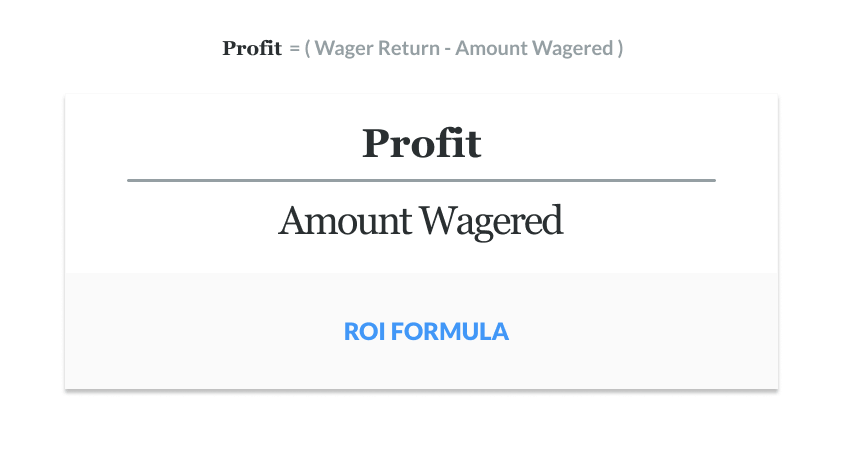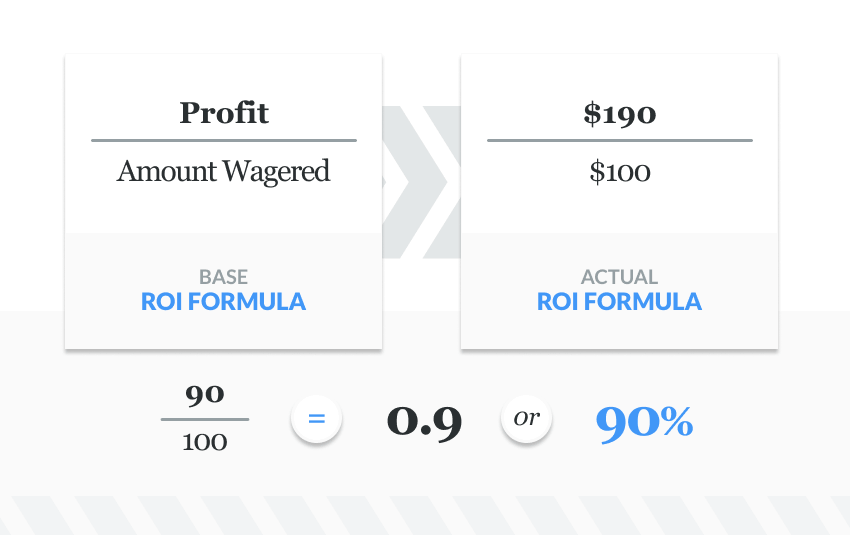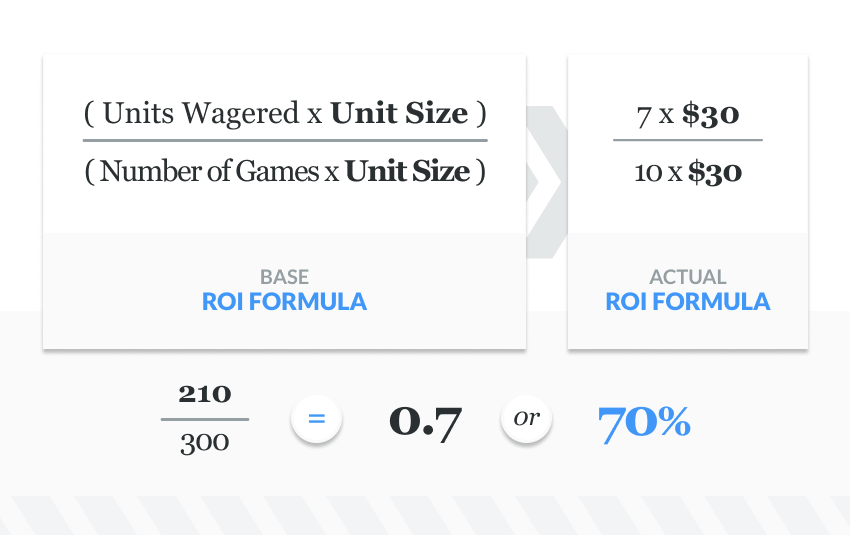Sports Betting ROI: Calculating Return on Investment for Your Wagers

Sports betting as an investment is something of a new idea, at least in terms of widespread public acceptance and interest. And while there are undoubtedly differences between sports betting and the stock market, they are far more similar than most people think.
Return on investment, or ROI, is a fundamental financial metric used by investors. In both traditional investing and sports betting, return on investment means the same thing:
ROI is a measure of the efficiency of an investment – or how much money you can expect to make relative to the amount of money you risk.
This brief guide explains how to calculate return on investment when betting on sports and reveals how you can easily use it to evaluate your strategy and make adjustments for more profitable returns season after season.
How to Calculate Return on Investment: Use this Simple Formula
Finding the ROI of any sports betting event is simple. To find the ROI of a single wager, all you need to do is divide the profit by the total cost of the investment (or wager):

Say you wagered $100 on a winning moneyline bet at -110 odds. We know this correct pick would return $190; but what’s the relative value in terms of ROI? The math follows:

A slight variation of this formula works to find the ROI of a betting strategy that uses consistent unit sizes, allowing you to find the overall return on investment for all games wagered on.
Calculating Betting Strategy ROI
Say you wanted to evaluate the efficacy of a 10-wager betting system you tried, which saw you win 7 betting units after risking $30 on each bet. The math follows:

Calculate Team ROI: No Math Required
If you’re not a fan of algebra but are a fan of saving time, check out our NFL ATS standings, which goes into much more than NFL trends ATS, tracking sports teams as investments over time. Our team trends pages evaluate each team across all major sports, using return on investment as the primary metric.
Optimizing your betting strategy for ROI is the key to making money betting on sports.
With team trends, you can quickly view each team’s ROI on the season to-date (or for the previous season) in addition to viewing the value of each win or loss individually. You can also filter the data by type of bet (moneyline, point spread, totals) and specific scenarios, such as at home vs. away and as favorite vs. underdog. All said and done, you gain a comprehensive picture of the team’s overall value as an investment.
So, why is understanding return on investment so important for bettors?
Comparing the return on investment between two wagers, teams, or strategies tells you which one will make more money, assuming you risk the same amount on each. It’s an expression of value, and sharp betting is all about finding value.
Try the tool for yourself if you want to see the teams that perform as investments, and then do a little basic algebra to find your overall ROI this season so far. This comparison can help you gauge the success of your betting strategy. Maybe consistently betting a single team offers more value than whatever strategy you’re using. Team trends provide the info needed to adjust your strategy and wager on teams and scenarios that provide the most value.
After all, optimizing your betting strategy for ROI is the key to making money betting on sports.
Can’t I Simply Track My Profits and Win-Loss Record?
Of course. You should track the overall amount you’ve profited and your win-loss record. These metrics are useful high-level views of your past performance, but they aren’t very helpful in helping you optimize your betting strategies moving forward.
Comparing your profits year-over-year, for example, tells you whether you’ve gotten better over time. But such a comparison does not tell you where that value came from (aka how you got better) or how you can replicate it going forward.
The same goes for win-loss betting records. You undeniably need to understand sports and make informed, winning picks in order to make money betting on them. A solid win-loss record clearly indicates that you’ve picked teams that can win.
But in sports betting, not all wins are created equal. Some correct picks are simply worth more than others. Sports betting ROI tells you which ones are worth the most.
Risk vs Reward: Why Does Sports Betting ROI Fluctuate?
Sports betting odds are not fixed. If you understand how odds are calculated, you know that they fluctuate widely depending on the expected outcomes of both the public and sportsbook. The factors that go into sports handicapping are complex, but you will always see better returns correctly picking underdogs rather than favorites.
It follows that if you consistently pick favorites or purchase extremely stable financial instruments, you need to place more wagers or purchase more securities in order to see the same return as you would with fewer, riskier wagers and investments.
Longer odds come with a higher potential payout, but the risk is inherently higher when you consistently pick teams or stocks the market views as volatile or unlikely to succeed. Underdogs offer more value than favorites, but only if they end up defying the odds for an outcome the market didn’t anticipate.
You are balancing risk and reward every time you make a bet or investment. In this sense, sports betting is very much like playing the stock market. Tracking your ROI over time tells you whether you’re striking the right balance.
Find Sports Betting Strategies with the Best ROI
You’ve grasped the importance of ROI as a metric to evaluate sports betting success or the long-term profitability of a team or strategy. So, how do you find the teams and strategies with the best return on investment?
Visit our team trends to compare teams across all major sports, evaluating ROI for the entire season or in specific situations.
Of course, responsible behavior is the key to keeping sports betting fun and profitable. Please exercise responsibility with all your wagers. Used properly, the tools and strategies outlined here can help.

Evergreen Manager; Sportsbook Expert
Following a sports journalism career with his work appearing in outlets like theScore, The Province, and VICE Sports, Patrick moved into the world of content marketing to bridge the gap between great writing and SEO success. He’s brought that same mindset to lead evergreen content efforts at SBD.




